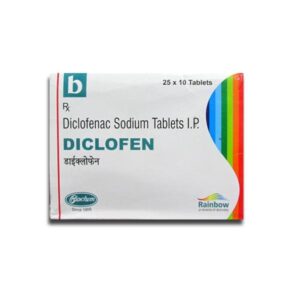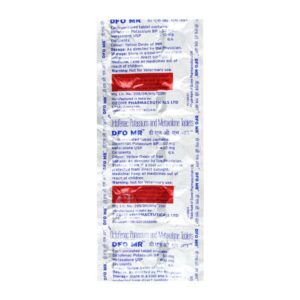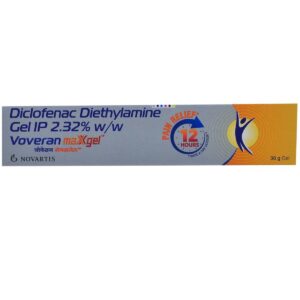DICLOFENAC
DICLOFENAC: Diclofenac is a nonsteroidal anti-inflammatory drug (NSAID) that is commonly used to relieve pain and reduce inflammation in various conditions. It is available in different forms, including tablets, capsules, gels, and injections.
The primary use of diclofenac is for the treatment of pain and inflammation associated with conditions such as arthritis (rheumatoid arthritis, osteoarthritis), gout, ankylosing spondylitis, and menstrual pain. It can also be prescribed to manage pain after surgery or dental procedures.
Diclofenac works by inhibiting the production of prostaglandins, which are chemical messengers responsible for pain, fever, and inflammation. By reducing the levels of prostaglandins, diclofenac helps to alleviate pain and swelling.
The dosing of diclofenac can vary depending on the specific form and strength of the medication, as well as the condition being treated. It is typically taken orally, with or without food, and the dosage is often divided into multiple smaller doses throughout the day. The recommended dose may vary between 25 mg to 150 mg per day, but it is important to follow the instructions provided by the healthcare professional or stated on the product label.
As with any medication, diclofenac can cause side effects. Common side effects may include stomach pain, nausea, indigestion, diarrhea, dizziness, headache, and skin rash. Some individuals may also experience more serious side effects, such as gastrointestinal bleeding, liver or kidney problems, heart-related risks, and allergic reactions. It is essential to inform a healthcare provider if any side effects occur or worsen.
Diclofenac should be used with caution in certain populations, such as individuals with a history of stomach ulcers, bleeding disorders, high blood pressure, heart disease, or kidney/liver problems. It is generally not recommended for use in pregnant women, especially in the third trimester, as it may harm the fetus.
In summary, diclofenac is an NSAID commonly used to treat pain and inflammation in conditions like arthritis. Its mechanism of action involves reducing the production of prostaglandins. The dose and formulation may vary depending on the condition being treated, but it is essential to follow the prescribed instructions. While generally effective, diclofenac can cause side effects, and it is important to communicate any concerns or adverse reactions with a healthcare professional.




















